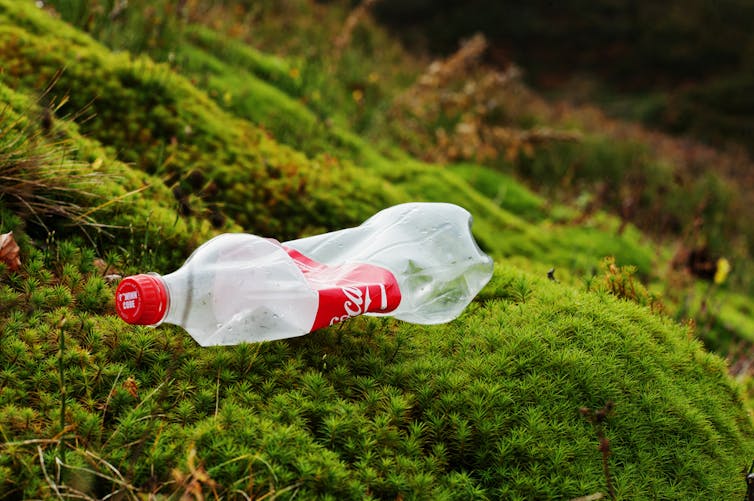
Four tough actions that would help fight the global plastic crisis
Christine Cole, Nottingham Trent University
The environmental impact of plastic is finally receiving the attention it deserves. This is partly down to the BBC’s Blue Planet II highlighting the problem of ocean plastics. But it’s also because the Chinese government has recently imposed quality restrictions on the import of recyclable materials, in an attempt to address domestic concerns over pollution and public health.
Beijing’s move in effect closes down the export of recyclable plastics, paper and other materials from the world’s richest countries. The UK, rest of Europe, US, Australia and others have for a long time been dependent on China to take the poor quality materials that they collect and do not have the infrastructure or capacity to use themselves. Until more recycling plants are built to deal with it domestically, the UK faces a build-up of plastic waste.
Other countries in Asia will continue to accept some of the lower quality materials, but this is a temporary fix at best. Sending plastic to India, Vietnam or Cambodia instead of China may limit the amount that has to be stored, placed in landfill or burnt in the UK, but it does nothing to reduce the overall amount of plastic.
We cannot simply rely on the actions of concerned individuals. What’s needed goes beyond reusing plastic water bottles, stopping using plastic drinking straws and taking reusable bags to the supermarket.
Here are a few suggestions:
Recycle quality – not just quantity

Recycling targets tend to focus on quantity, but the quality of materials collected is just as important. Recycling “quality” refers to how clean and well sorted individual materials are. Poorly sorted materials are referred to as “contaminated”, and it is this that China will no longer accept. (If you want to avoid contaminating your recycling collection, check out these top tips).
If the UK improved the quality of the material collected for recycling, it could still be sent to China. This would require a nationwide collection system for materials suitable to be used again (recycled). This may take the form of reworked household collections, comprehensive collections from business premises, or a revival of the “deposit and return” schemes that once covered glass bottles and today could also include plastic bottles, drinks cans or coffee cups.
Stop collecting stuff for the sake of it
Recycling collections from households are often criticised for being inconsistent and confusing. It is important to remember that local authorities do not themselves “recycle”. They collect waste and, separately, materials like glass bottles or cardboard boxes which are suitable for recycling.
After they have been collected these separated materials become secondary raw materials, which are only truly recycled when they are actually made into something else. Local authorities collect the materials that can be reprocessed into something else.
If the infrastructure to sort certain items or materials does not exist locally (as with some crisp packets, polystyrene take away boxes or coffee cups) it is only sensible for those items not to be collected. So stop collecting things for the sake of it, put in place the facilities to deal with a wider range of materials or ban the difficult to recycle materials.
Boost demand for recycled plastic
Countries like the UK need to develop their own demand for recycled material. This means supporting manufacturers to develop technology that can use it where possible.
Alternatively, the government could impose mandatory recycled content for various plastic products. Coca Cola, for instance, recently announced that by 2020 its bottles will contain 50% recycled material. This is a step in the right direction, but why only 50%? If this target was increased the sheer scale of production means there would be a huge impact.

AS photo studio / shutterstock
Producers must be held responsible
Increase producer responsibility for the plastic products they place on the UK market. Existing arrangements could be reformed so that they encourage recyclability to be built in at the design stage, while incentivising the maximum use of recycled content. Regulations could tax or ban the use of non-recyclable products or those that use particularly difficult materials, and they could ban some single use plastic products (France has already done this). A 25p charge has recently been suggested to control the use of non-recycleable or hard to recycle coffee cups in the UK, which may reflect the success the 5p carrier bag charge had in reducing the number of single use plastic bags used by shoppers.
Pringles containers and Lucozade bottles have recently been highlighted as problems. The combination of multiple materials used to make them mean they are difficult to recycle without specialist techniques not available in most UK processing plants. Black plastic used for ready meal containers is also difficult to recycle and creates the kind of contamination problems the Chinese are trying to avoid. Why is this material still being used if it is recognised to be a problem and there are economic alternatives?
Let’s take advantage of the current mood. While there is a public focus on plastics, people should learn more about their purchasing decisions and recycling actions. On a larger scale, it is at times of crisis or failure that policy makers become open to new ideas, or old ones recycled. This is one such failure which offers a real opportunity to wake up and improve our environmental impact.
Christine Cole, Research Fellow, Architecture, Design and the Built Environment, Nottingham Trent University
This article was originally published on The Conversation. Read the original article.